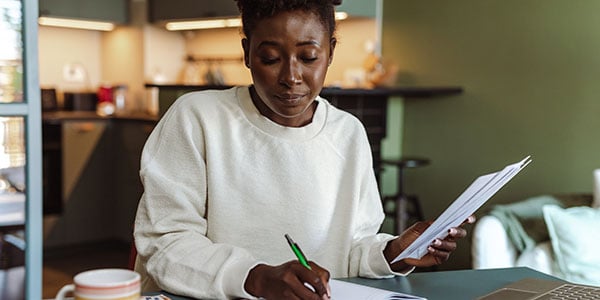
Study in South Africa: Your visa application made easy
If you’re planning to study in South Africa, securing a South African study visa is a crucial first step. We understand that the visa application process can seem daunting, filled with paperwork and complex requirements.
Many students worry about missing deadlines, gathering the right documents or even understanding the regulations. This guide is designed to alleviate those fears. Let’s break down the process into manageable steps and practical tips to help you prepare your documents, avoid common pitfalls and navigate the application smoothly.
Your dream education is closer than you think
If you’re a South African national, you don’t need a student visa. Use our student loan calculator to see what you may qualify for.
Why you need a study visa
A South African study visa is your official permission to live and study in the country as a non-citizen. It's essential for legally residing in South Africa while pursuing your educational goals, whether you're starting your academic journey in primary or secondary school or advancing your studies at a university, college or vocational training programme.
Without a valid study visa, you risk facing legal complications and potential deportation.
Where to apply
You can apply for your study visa at either of the following:
- A South African Embassy in your home country
- A Visa Facilitation Services (VFS) Centre
The essential document checklist
The most important form is the BI-1738, available from the South African Department of Home Affairs (DHA). However, you'll need to gather several other documents to complete your application. Here's a checklist to get the right documents ready:
- Valid passport: Your passport must be valid for at least 30 days after your intended study period ends. To ensure you are on the safe side, it’s best to aim for at least 6 months of validity and ensure you have at least 3 blank pages.
- Acceptance letter: You’ll need to provide official proof of registration and provisional acceptance from your chosen educational institution.
- Visa application fee receipt: You’ll need proof that you've paid the required visa application fee.
- Letter from your institution: This letter must include the following:
- The exact duration of your study programme
- The specific course or field of study
- Confirmation that you are not displacing a South African student
- A statement that the institution will notify the DHA if you deregister or fail to re-enrol
5. South African medical aid: You’ll need proof of membership in a South African medical aid scheme. Learn more about medical aids for international students.
6. Medical and radiology reports: You’ll need recent medical reports, a vaccination certificate and radiology reports. Important: These reports must be no older than 6 months.
7. Financial proof: Bank statements or other documentation showing sufficient funds to cover tuition, accommodation and living expenses must be provided.
8. Return ticket funds: You’ll need proof that you have access to the funds needed for a return ticket to your home country.
9. Police clearance certificate(s): If you are 18 or older, you'll need a police clearance certificate from every country where you've lived for 12 months or more since turning 18. A police clearance certificate confirms whether you have a criminal record.
Additional documents
Depending on your circumstances, you may also need the following documentation:
- African country nationals: An undertaking from your home country's government guaranteeing responsibility for deportation costs, if necessary
- Marital status documents: If married, divorced, widowed or separated, the relevant certificates
- Minors (under 18):
- Unabridged birth certificate
- Proof of a designated guardian in South Africa, including their contact details
- A letter from your guardian confirming their role
- Consent from your parents or legal guardian(s) allowing you to study in South Africa, along with proof of their identity
How long is a South African study visa valid?
Your South African study visa is typically valid for the duration of your accepted programme. However, if you transfer institutions, you'll need to reapply.
For primary school, visas are valid for a maximum of 8 years, and for secondary schools (high school), visas are valid for a maximum of 6 years.
When doing research and going through the visa application process, always keep in mind that the requirements can change. Also remember to check whether your educational institution has specific requirements.
Ready to start your South African study adventure?
We understand the complexities of being an international student in South Africa. From bank account to bursaries and more, access our dedicated resources to help you prepare for your studies.
Disclaimer: This article is solely intended for information. It does not constitute financial, tax or investment advice or recommendation. Please speak to a financial advisor or registered financial professional before making any financial decision(s).
Standard Bank, its subsidiaries or holding company, or any subsidiary of the holding company and all of its subsidiaries make no warranties or representations (implied or otherwise) as to the accuracy, completeness or fitness for purpose of the information provided in this article or that it is free from errors or omissions.




